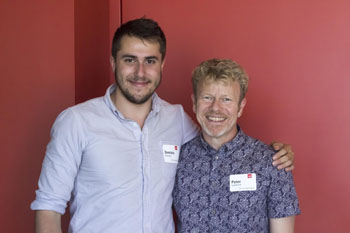Dominic Romano (Porter, '15, film and digital media/modern literature) took a creative risk when he undertook a complex project that combined critical writing on Lebanese cinema with images of scars and trauma.
He had no way of knowing how other people would react to “Bodies of Trauma,” a written thesis and video that reflects on the personal, cultural, historical, and physical dimensions of trauma--from the Lebanese civil war to situations closer to home.
The response, as it turns out, has been overwhelmingly positive. In a ceremony at the University House, capping off Student Achievement Week from June 1-5, Romano was awarded the 2015 Steck Family Award, UC Santa Cruz’s highest undergraduate honor.
Loren Steck (Porter '73), a UC Santa Cruz Foundation trustee, chairs the distinguished selection committee. The Steck family created the endowment that funds the award.
As usual, the identity of the Steck honoree was a closely guarded secret right up to the end of the ceremony.
“Having this project acknowledged, and representing the arts, is extremely important to me," Romano said."To have this resonate with other people is very powerful for me.”
His project took shape in the rigorous "integrated critical practice" track in the film and digital media department. Romano's video, closely linked to the written portion of his thesis, focuses on physical scars and the emotional and psychological traumas they reveal for those who bear them. While his writing critically examined the post-1990 Lebanese film and video scene, the video emerged from interviews with people who’d suffered from physical scarring.
Romano came to his subject during a course taught by Peter Limbrick, associate professor of film and digital media, who became one of his thesis advisors along with Irene Lusztig, an associate professor in the same department.
Limbrick's class focused on film, video and documentary work from Lebanon and Syria and inspired Romano's project.
"I found the work of these artists to be some of the most poignant, honest, visceral, and human I had ever seen and I immediately fell in love with it," Romano said.
Limbrick takes great pride in the fact that his class was the inspiration for Romano's project.
“A lot is at stake in the conception of critical-creative projects like this one,” Limbrick said. “How is he going to tie the written and visual elements together? How will they relate to each other? Rather than take a literal approach and pretend to represent Beirut or Lebanon in his video, (Romano) reflected on what he learned from these filmmakers about the unfinished nature of trauma and the traces it leaves. Remarkably, he managed to conceive these things together before he shot a single frame of the video. It really went hand-in-hand.”
The project’s themes of trauma and healing were personal for Romano, a friend of McHenry Library staff member Josh Alper, who was killed in 2013 while biking on Highway 1 north of Santa Cruz. Romano worked with him in the Interlibrary Loan office.
“I would see him every day,” Romano said. “We played music together. I’d never really lost anyone before. It was a big hit for me, and it happened just before I started working on my thesis and taking Prof. Limbrick’s class.”
Reflecting the ambivalent mood of the Lebanese art and movies he was inspired by, Romano found himself in a middle place, “grief, and joy, and going on, but also having the past pulling on me.”



